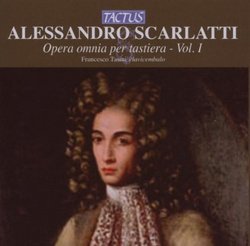| All Artists: Alessandro Scarlatti Title: Alessandro Scarlatti: Opera omnia per tastiera, Vol. 1 Members Wishing: 0 Total Copies: 0 Label: Tactus Records Original Release Date: 1/1/2007 Re-Release Date: 11/13/2007 Genre: Classical Styles: Chamber Music, Forms & Genres, Improvisation, Historical Periods, Baroque (c.1600-1750), Classical (c.1770-1830) Number of Discs: 1 SwapaCD Credits: 1 UPC: 8007194103724 |
Search - Alessandro Scarlatti :: Alessandro Scarlatti: Opera omnia per tastiera, Vol. 1
 | Alessandro Scarlatti Alessandro Scarlatti: Opera omnia per tastiera, Vol. 1 Genre: Classical
Recently, the importance of Alessandro Scarlatti has been reevaluated particularly as the real founder of the important "Neopolitan keyboard music school." Scarlatti's keyboard music, at one time considerably obscured by... more » |
Larger Image |
CD Details
Synopsis
Album Description
Recently, the importance of Alessandro Scarlatti has been reevaluated particularly as the real founder of the important "Neopolitan keyboard music school." Scarlatti's keyboard music, at one time considerably obscured by preference for his son's corpus of sonatas, directly or indirectly influenced the keyboard works of his contemporaries Gaetano Greco (1657-1728). Alessandro Scarlatti's reputation at the beginning of the 18th century can be deduced from the enormous quantity of manuscript copies of his works conserved in libraries all over Europe. This is true, above all, of his keyboard compositions, which come from multiple scattered sources.

 Track Listings (16) - Disc #1
Track Listings (16) - Disc #1